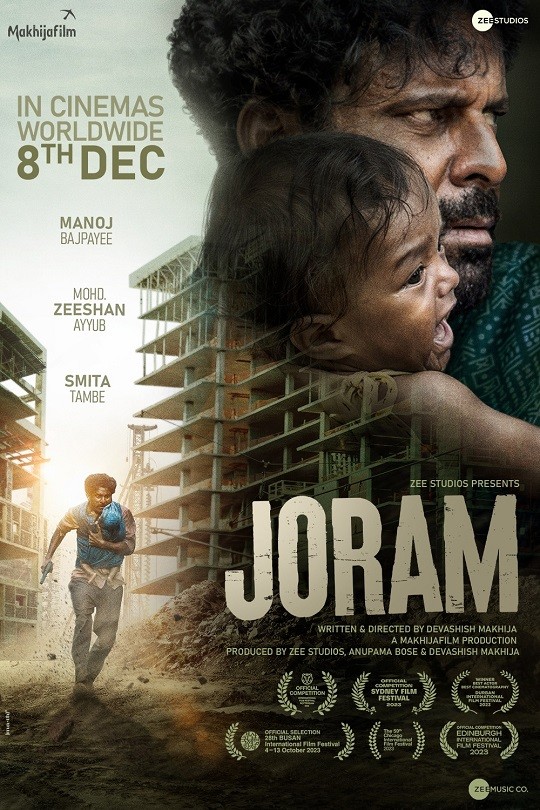Joram
Introduction
Onto the next release of the weekend and I finished watching the new Hindi film Joram which is now available in a theatre near you. Directed by Devashish Makhija, the film has been doing rounds successfully in film festivals across the globe. In fact, I even wished to watch it at MAMI but had to miss it eventually. Yet, my curiosity around the film was at its peak, and thankfully the film did get a theatrical release! If you have been an avid follower of Devashish Makhija and his filmography then you would know that he did begin his career in a no holds bar film Ajji followed by Tandav and later the unassumingly disturbing film Bhonsle. Now if you notice, there is an inherent streak of politics in his films laced with a dark theme that truly set them apart.
But, like the case with many filmmakers in the last decade, the freedom of speech has slightly being curtailed with the changing landscape of the politics. As a result, you would see many filmmakers losing their voice. Now I had the privilege to interview Devashish Makhija and I did pose the same question to him on where do you draw the line in the wake of censorship and the political climate of the country. And his answer has stuck with me since. He said you needn’t play out the politics of your film in the first layer but instead allow it to playout as an undercurrent in the second layer. I was immensely impressed by these words solely from a viewer’s standpoint given that that would translate into better stories transpiring onscreen. With Joram, he had a stellar cast featuring Manoj Bajpayee, Mohammed Zeeshan Ayyub and Smita Tambe amongst others on show that made me even more curious about the film. In the year that saw Pathaan, Jawan, Gadar 2 and Animal rule the roosts, I was willing to give Joram a chance for the sheer effort that may have gone in releasing the film theatrically. That said, does Joram manage to impress, let’s find out!
Story & Screenplay
Joram follows the story of a man with an infant who is on the run after falsely being implicated with a crime that he did not commit. This, while the story is played out against a searing commentary of the politics of land that is prevalent right throughout. The story here is niche and essentially a layered political drama masked as a survival thriller. So if you are expecting an adrenaline rush throughout the drama then do manage your expectations accordingly. This is more in the space of a moody atmospheric drama that touches upon several issues along the way in the most subtle manner possible! The approach is textured and understated! And there is a lot to unpack here in a screenplay standing at just under 2 hours that makes for a poignant watch while you just about seethe with anger within.
The drama opens with a two characters interacting with each other rather playfully while one of them is shown to be on a swing tied againat the bark of a tree. The drama cuts to a later timeline in which the two characters find themselves in the concrete jungle of Mumbai wherein the only swing that they can afford for their toddler is tied to the two concrete walls. These two frames tell a thousand words about the first issue that is being addressed, with a layer of politics thrown in. Environment as we know, is just neglected by the authorities in the name of development that does eventually result in the axing of trees(Aarey Metro shed seems familiar?). The drama here has an element of mystery surrounding it given that it took me a while to understand the context of the events here. The writers choose to unfold the drama in a non-linear pattern that does result in a bit of a jigsaw puzzle being set for the viewers to decipher. There is a lot of assumptions that run through your head with a brief flashback just about providing a hint of what may have transpired along the way!
The proceedings are understated by engrossing particularly following a murder that takes place thereby resulting in the protagonist being on the run with his infact. Yet from time to time, the politics of the drama comes to the fore either in terms of the politics of development that is about to take place with the government forcibly acquiring the land from the tribals, or in a different setting providing a searing commentary on the plight of the police officers(particularly the character of Mohammed Zeeshan Ayyub) investigating the case. In between, the angle of the naxalites is also touched upon that further adds a layer of a mini conflict with respect to the government amidst a subplot of revenge. But what remains stagnant is the plight of power versus the powerless that often takes centerstage, particularly with the latter either just being a pawn(depending on the hierarchy of the food chain) or merely being bumped off for being a sympathizer, both of which results in a lose-lose situation for the common man stricken with poverty.
The events unfold at a leisurely pace almost inviting the viewers to imbibe the atmosphere that it plays too. Yet, in sudden bouts of urgency there are two set pieces – one in the first hour featuring a chase inside a moving train, and the other towards the dying minutes of the film. The former is probably one of the most tense chase sequences that I have been witness to this year, which is also edgy and raw in many ways while being claustrophobic. The latter arises more out of the politics of the land wherein the protagonist returns, only to find all trees chopped off and the tribals guarding them either killed off or disappeared mysteriously. There is a burning anger that is simmering gently while being cautious about his infant who is probably the last hope for him. As a result, the ending of the film that is open to interpretation, also stems from the fact that the power is hunting down the last hope of mankind with the protagonist and his infact being used as a metaphor for the last standing tree(a shot of a tree which you get a little prior to that in the most disturbing manner possible). This, while the entire system is against him, all in the name of politics. Slow claps! Overall, the screenplay is brilliantly penned and accounts for a compelling watch despite being a niche in many ways!
Dialogues, Music & Direction
The dialogues are sparingly used and I liked the creative decision of using the local dialect to communicate, something that added a layer of authenticity to the drama. The music is earthy and quite rooted to the land where the drama is set in. The BGM is understated, often relying on the natural sounds to create an atmosphere of intrigue with subtle bouts of tension sprinkled throughout the narrative. The cinematography is absolutely brilliant by balancing the stillness of the drama with urgency that is marked with a jerky frame. The jerky frame used in the chase sequence of the train is phenomenal but the DoP doesn’t get carried away with the same, while presenting a gentle followup frame that truly highlights the essence of the drama. The editing is crisp and sharp with almost no jump cuts that keeps the atmospherics of the drama alive until the very end! Director Devashish Makhija does a splendid job all over again and how! His direction is unassuming, often relying on the intellect of the viewers to decipher a scene while maintaining a subtle thread with respect to the politics in the drama, that doesn’t overpower the narrative neither does it force you to take sides. The direction is masterful in creating a dilemma for the viewers who themselves are at different hierarchies of the food chain, and contributing indirectly to the power politics of the country. The messaging was subtle but impactful in so many ways.
Performances
The performances are brilliant by the ensemble cast. Tannishtha Chatterjee as Vaano is simply phenomenal and she is excellent in the drama. Bharati Perwani as Khare and Dhaniram Prajapati as Divinder are such splended actors who leave a mark despite a limited screen time. Nimmy Raphael as Samakka is first rate and very dependable in her role. Kajal Keshav as Constable Sathe is impressive in a good job done. Apurva Mahesh as Manju is pretty good too. Megha Mathur as Bidesi is such a natural onscreen and she makes her presence felt, wonderfully well! Smita Tambe as Phulo uses the silence in her character so beautifully and she creates a daunting and intimidating image in the minds of the viewers just so effortlessly. Her actions and mannerisms are spot on and at times with send a shiver down your spine. Mohammed Zeeshan Ayyub is a brilliant actor himself and he uses an understated approach to his character of Ratnakar. The idea was to be a cop without imitating to be one, and he does an excellent job in creating an image of being powerless despite donning the uniform that is reflective through a frown on his face. He was just so brilliant here.
This brings me to Manoj Bajpayee who is in the form of his life this year following the success of Banda. Here as Bala, he is wonderfully restrained, often relying on his expressions to convey the mountain of pain that he is undergoing while also pushing himself to survive against the system. His performance is almost like a lullaby that engulfs you in his journey while you silently root for him. Not an iota of drama that he resorts to, just his eyes that express a thousand words. If there are any budding actors out there, study the approach of ‘less is more’ that also imbibes a beautiful texture and flavour in this acting masterclass!
Conclusion
Joram is a layered and a searing political commentary masked as a survival thriller that comes with my highest recommendation. Deciphering the subtext and the underlying themes has seldom been so fruitful! Available in a theatre near you and Highly Highly Recommended!




